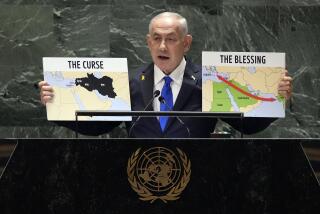Netanyahu Can’t Stop Peace Process, Arab Leaders Say
AQABA, Jordan — The three Arab leaders who have gone the furthest to promote peace with Israel said Wednesday that the election of Benjamin Netanyahu as Israel’s next prime minister will neither derail the peace process nor prevent the creation of an independent Palestinian state.
Attempting to project Arab unity and dispel fears of an imminent breakdown in Arab-Israeli relations, President Hosni Mubarak of Egypt, Palestinian leader Yasser Arafat and Jordan’s King Hussein met in this Red Sea city and said they are counting on Netanyahu to honor agreements previously made by Israel and to build on them.
For now, they said, they will disregard Netanyahu’s campaign promises ruling out a Palestinian state, any Palestinian claims to Jerusalem and any surrender of the Golan Heights.
“The election campaign was like any election campaign. It involved many statements. But when someone becomes responsible, things change,” Mubarak said at an outdoor news conference attended by all three leaders.
“We are convinced, totally convinced, that the peace process is irreversible, that all that has been agreed upon will be implemented and that work toward a comprehensive settlement will continue,” Hussein added. The meeting at the monarch’s palm-tree-lined Aqaba Palace, which overlooks the sea within sight of the Israeli port of Eilat and the Egyptian resort of Taba, was part of diplomatic activity in recent days to foster unity and reconsider Arab strategies in light of the Israeli election results.
On Monday, Mubarak hosted Syrian President Hafez Assad in Cairo.
*
Maintaining the relatively moderate tone he has adopted since his election, Netanyahu on Wednesday welcomed the Aqaba statements endorsing the peace process. He also telephoned Sultan Kaboos ibn Said of Oman and reiterated his desire to continue seeking peace, the Oman News Agency reported.
Despite such gestures, many Arabs remain uneasy about Netanyahu, who in his campaign castigated the Israeli government’s peace policies and said he would be much tougher than his opponent, Prime Minister Shimon Peres, had been.
Confidence in Netanyahu now being expressed by Mubarak, Hussein and Arafat should not be taken too seriously, said James Zogby of the Arab American Institute in Washington. The political fortunes of Arafat and Hussein are so closely linked to Israel and the peace process that they cannot afford to come out fighting with the incoming Israeli leadership, Zogby said. “They have one public posture, but privately they are concerned.”
However, if influential Saudi Arabia and Syria signal that it is time to slow down normalization of relations with Israel, the rest of the Arab world may follow suit, he said.
“The issue that is being talked about is: Does Netanyahu want a peace process, or does he just want a process” that would give an appearance of talks without making meaningful progress, Zogby added.
*
At Aqaba, Hussein went out of his way to make clear to the Israelis that Jordan and the Palestinians cannot be played off against each other. Jordan will never agree to rule the West Bank as a substitute for an independent Palestinian state, as some right-wing Israeli politicians have suggested, the king said. “The question is the right of the Palestinians on their soil. . . . We will never under any condition be a substitute for them,” Hussein said.
Arafat said he is unperturbed by Netanyahu’s not having contacted him directly. No matter what, Palestinians will achieve statehood “sooner or later,” Arafat said.
Speaking in English, Arafat also said the Palestinians will “declare very soon our independent Palestinian state and its capital” in Jerusalem--remarks that initially caused a stir in Israel.
However, Omar Khatib, chief of the Palestine Liberation Organization mission in Amman, Jordan’s capital, said Arafat’s English is imprecise and that he had not meant to say that a declaration of statehood was imminent. Others said Arafat was probably referring to the previously announced redrafting of the Palestinian charter, expected to be completed in the next few weeks.
Arafat has made such claims before, said a spokesman in Netanyahu’s office. “It is clear the prime minister-elect has a different view.”
More to Read
Sign up for Essential California
The most important California stories and recommendations in your inbox every morning.
You may occasionally receive promotional content from the Los Angeles Times.










